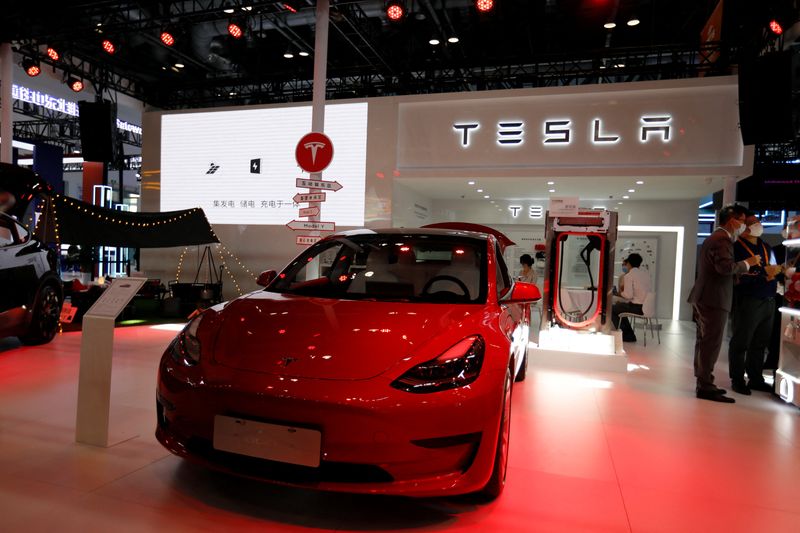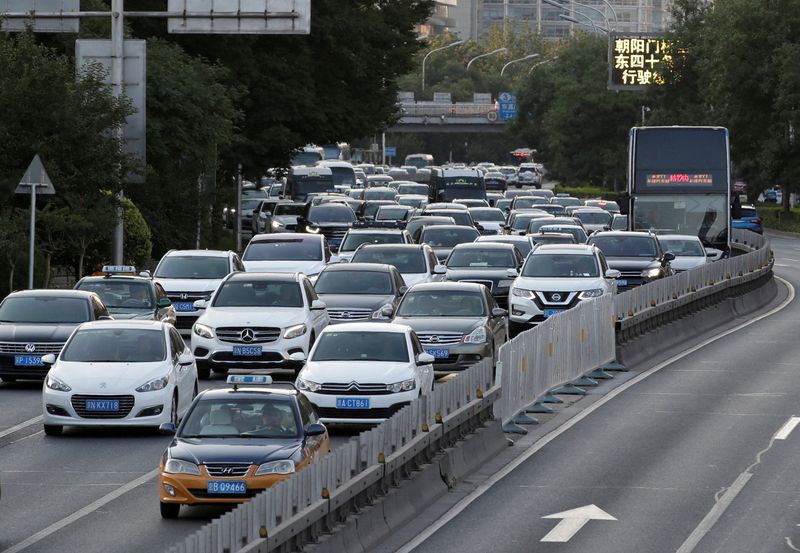(Reuters) -The group representing China's auto manufacturers has retracted a pledge to avoid "abnormal pricing" that it had brokered between 16 automakers, including Tesla, breaking off a truce in a brutal price war over electric vehicles.
The China Association of Auto Manufacturers (CAAM) said in a statement on Saturday it recognised the agreement had violated China's antitrust law and would retract it.
WHAT'S THE BACKGROUND HERE?
Intense competitive pressure: Since January, when Tesla cut prices in China, about two dozen automakers have followed with price cuts of their own to stay competitive and stoke demand.
The list of automakers includes Chinese brands like Xpeng (NYSE:XPEV), Geely and its affiliate brands like Volvo, state-owned Chery Automobile, NIO and Great Wall (HK:2333) Motor.
Global automakers followed. Ford cut prices on its Mustang Mach E EV. Toyota offered a discount on its bZ4X EV, and Nissan offered an incentive on its Ariya EV. General Motors (NYSE:GM), Honda, Stellantis, Ford and Nissan also marked down combustion vehicles, which are losing share to EVs and plug-in hybrids.
China's auto market, the world's largest, is on track to reach nearly 25 million vehicles in sales this year with overall growth of about 3%, and the share of EVs and plug-ins is rising fast. Consultancy AlixPartners forecasts this will be the first year made-in-China brands top 50% of their home market.
Those changes have created intensifying competition over price and features that is driving sales for EVs but also threatening industry-wide profitability, analysts say.
CAAM in March had urged automakers and local authorities to cool "price-cut hype" to ensure what it called the stable development of the industry.
Consumers had been waiting for bigger discounts before buying, analysts said, while some auto suppliers have been forced to accept payment cuts.
WHAT HAPPENED WITH THE 'TRUCE'?
On Thursday, at an event in Shanghai, CAAM brokered a series of commitments signed by executives from 16 automakers. The signatories included industry-leaders in battery vehicles Tesla and BYD, EV-focused Chinese brands NIO, Li Auto and Xpeng, as well as Geely. State-owned brands Chery Automobile, SAIC Motor, GAC Group, Dongfeng Motor and FAW Group also signed.
The signing was witnessed by an official from China's Ministry of Industry and Information Technology.
The letter included a pledge to "not disturb fair competition in the market with abnormal pricing" to stabilise the market and promote consumption. That was widely seen as a truce in the price war.
It appeared in doubt just a day later when Tesla said it was offering a referral payout equal to about $500 on its Model 3 and Model Y vehicles, including in China. Volkswagen (ETR:VOWG_p)'s joint ventures with SAIC and FAW also announced price cuts in China on their ID-series EVs on Friday.
On Saturday, CAAM retracted the pricing pledge.
Liu Xu, a researcher at the National Strategy Institute of Tsinghua University, said enforcement of antitrust law in China's auto industry had been selective and that the language of the pricing pledge was so vague it would be hard to determine if it constituted a price monopoly.
While steady price cuts by companies should be allowed, subsidies from local authorities should be removed as they distort the pricing system, Cui Dongshu, secretary general of the China Passenger Car Association, said on Monday.
WHAT HAPPENS NOW?
International automakers remain under intense pressure to restructure operations in China, and there are signs the pressure on consumer pricing is feeding back into worker furloughs and lower margins for suppliers.
Some expansion plans are in limbo. Tesla is still awaiting approval for a plan to boost output at its Shanghai plant, its biggest, most productive factory. Some workers making battery packs at Tesla were notified of layoffs at the Shanghai plant last week, although production plans remain unchanged.
Hyundai Motor, the world's No. 3 global automaker by sales, said last month it would close a plant in China and look to sell it with a factory it shut last year.

AlixPartners said while China's EV market will continue to grow rapidly, intensifying competition and excess capacity will also drive a shakeout. Only 25 to 30 out of the 167 companies registered to produce EVs or plug-in hybrids in China will survive by 2030, it forecast.
Meanwhile, Chinese brands are targeting growth outside China, including in Europe and Southeast Asia. In one example, Chinese automakers have invested $1.4 billion in Thailand since 2020, now dominating the Thai EV market after taking share from the Japanese brands that have long operated there.
